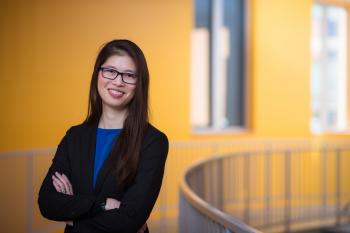
April 18, 2023
Callie Ayoub I MIT Department of Civil and Environmental Engineering (Original Article)
Professor Cathy Wu has received a Faculty Early Career Development (CAREER) Award from the National Science Foundation (NSF), its most prestigious honor for junior faculty members, for her work to advance cyber-physical systems into infrastructure.
Wu is the Gilbert W. Winslow (1937) Career Development Assistant Professor in Civil Engineering, core faculty in Institute for Data, Systems, and Society (IDSS), and principal investigator in the Laboratory for Information and Decision Systems (LIDS) at MIT.
The award supports promising early career faculty members who exemplify and serve as academic role models in research and education, and to lead advances in the mission of their respective departments. The award will allow her to continue research on advancing the methodology of large-scale cyber-physical systems (CPS).
The five-year, $550,000 grant will support her project “Learning for Generalization in Large-Scale Cyber-Physical Systems.” Examples of large-scale CPS include the large numbers of robots in a warehouse, turbines on a wind farm, control of autonomous vehicles, or traffic signals in a city. These systems can unlock transformative societal benefits across broad economic sectors and promise to contribute to the most pressing challenge of the century—climate change. Wu’s research aims to harness generalization across scenarios to enable performant, responsive, and seamless CPS.
“I am delighted that the NSF has chosen Cathy Wu to receive the CAREER Award,” says Ali Jadbabaie, JR East Professor, and head of the MIT Department of Civil and Environmental Engineering. “This award is an indication of the impact her research has on some of the most critical challenges society faces including transportation, supply chain and manufacturing, and climate change.”
The project also aims to boost K-12, undergraduate, graduate, and professional education by supporting and engaging students in research activities, promoting the translation of research to practice, and outreach efforts targeting middle school students from underrepresented and underserved communities.
“I’m thrilled about the CAREER award because it is a prime example of use-inspired basic research,” says Wu. “Our investigations into the impact of autonomy on mobility led us to the challenge that we will address in the CAREER project. Namely, that the scale and diversity of scenarios in these systems exceed current control and optimization methods. At the same time, there is potential to leverage that diversity to develop new methods, and thus we will explore generalization of learning-enabled methods as a key solution concept.”
Wu’s research studies the complex integration of automation such as self-driving cars into existing urban systems and intersects machine leaning, optimization, and large-scale societal systems. Throughout her career, Wu has collaborated across fields including transportation, computer science, electrical engineering, operations research, urban planning, and public policy.


